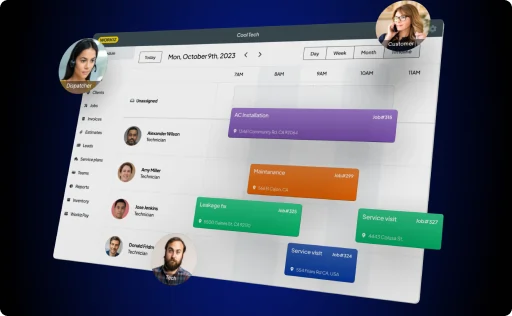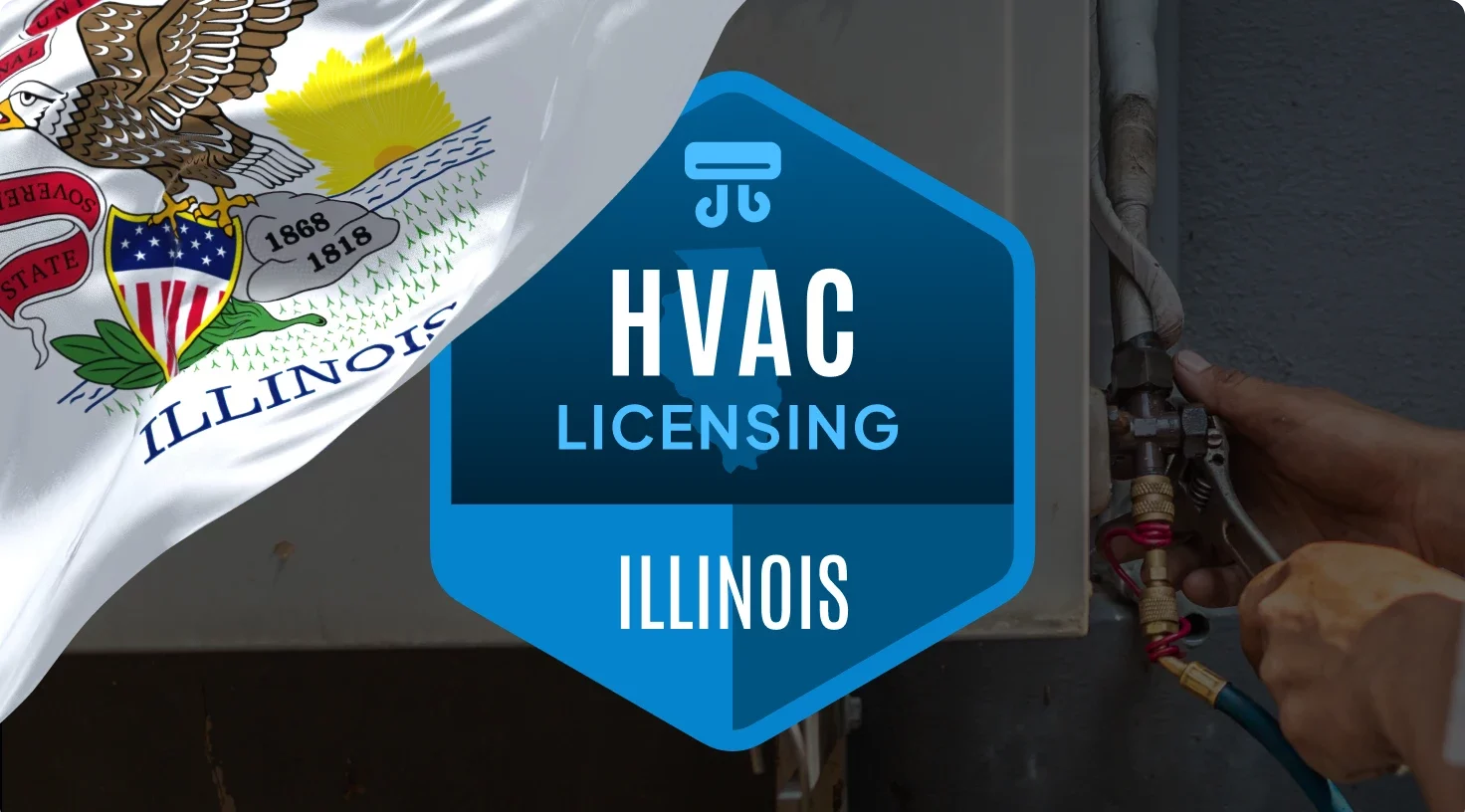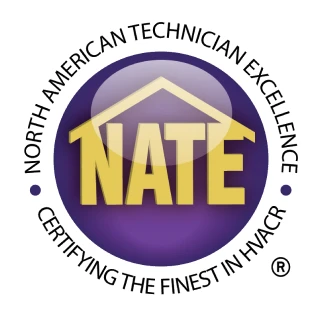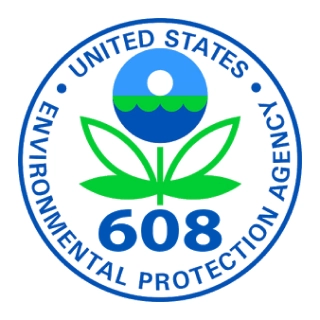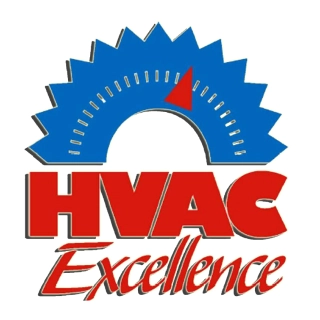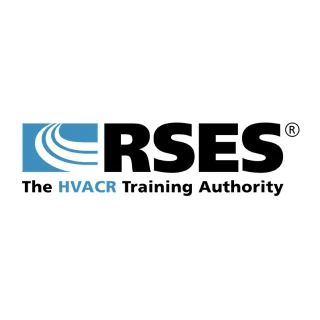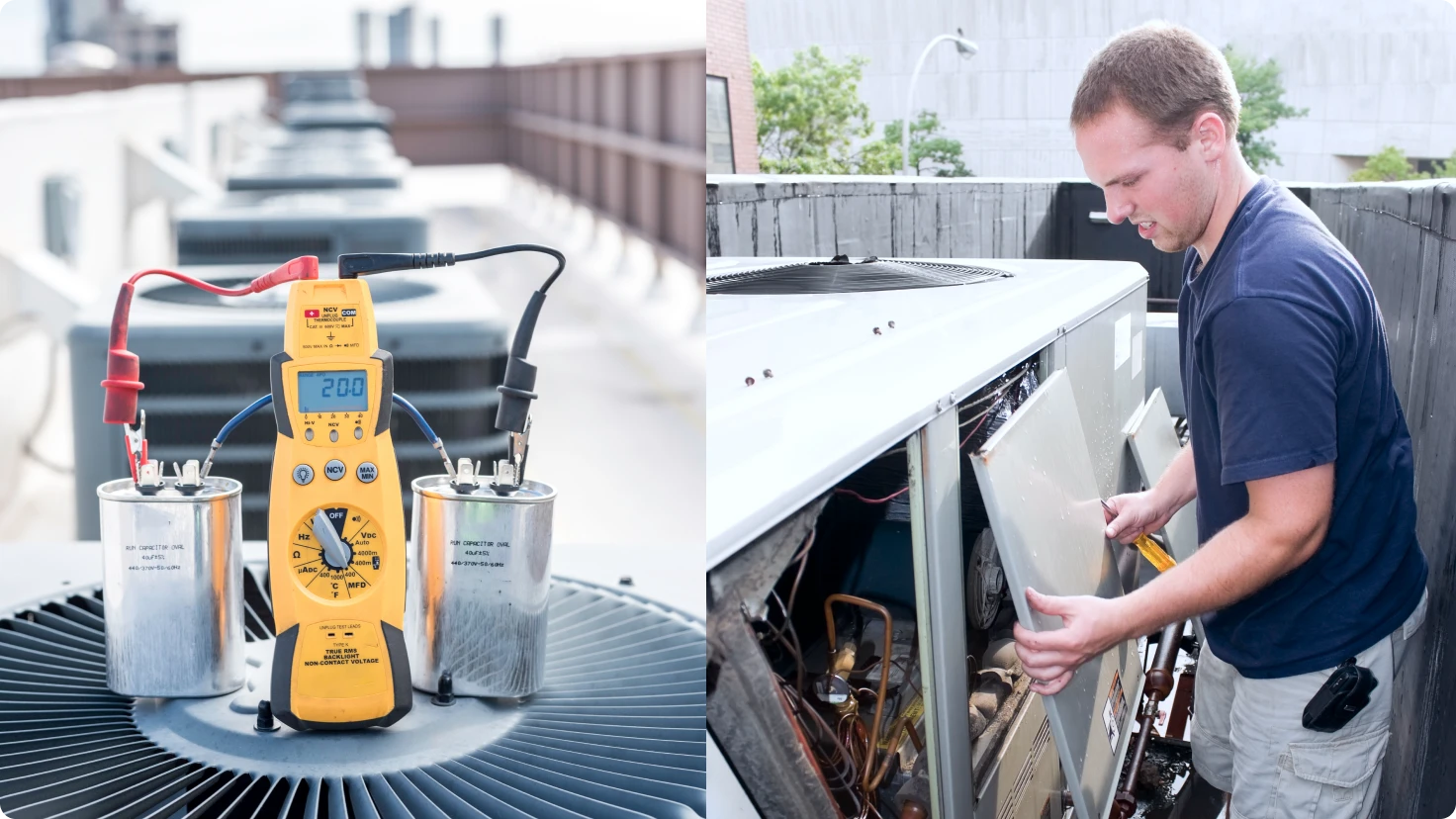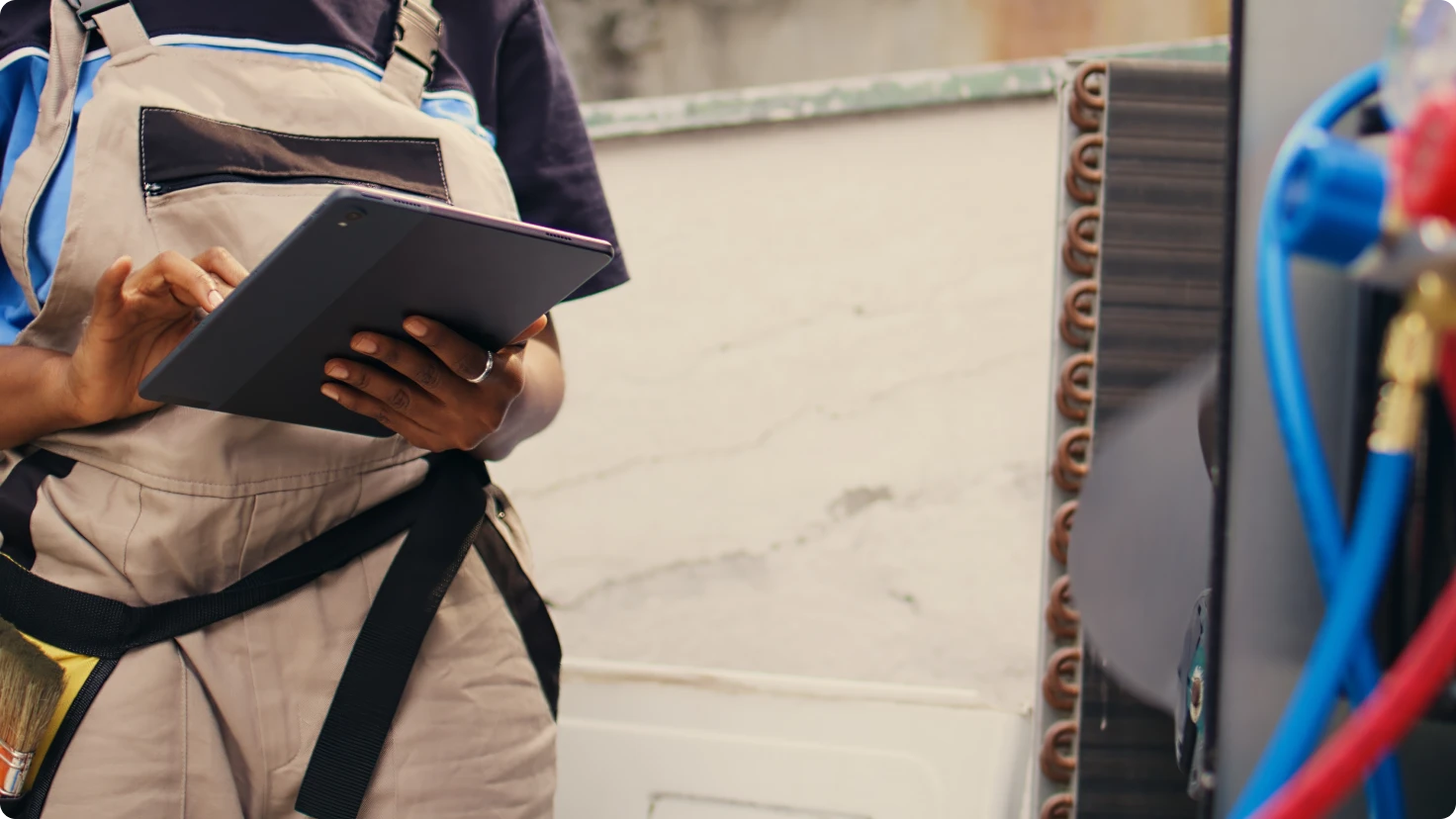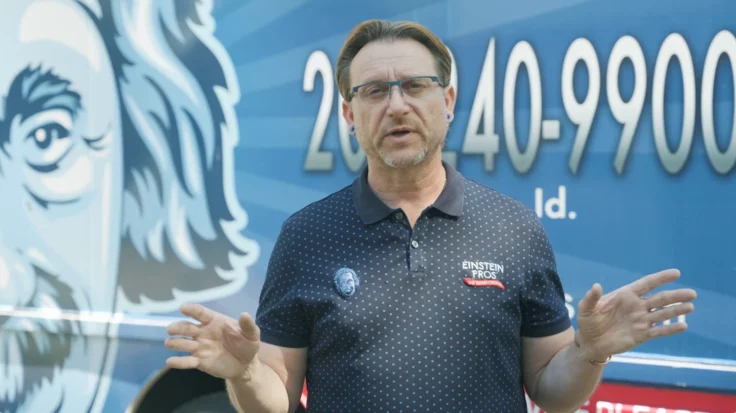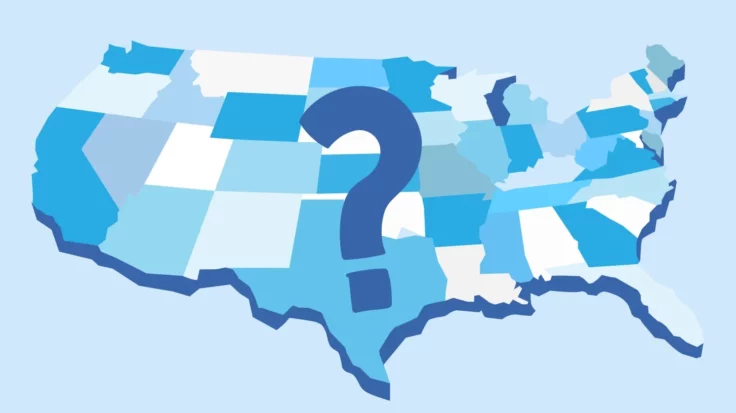Licensing requirements
Unlike some states, Illinois doesn’t mandate a statewide HVAC license. However, there are still certain considerations and local regulations that HVAC professionals should be mindful of in order to operate legally and effectively within the state.
HVAC certifications
Even though a state-wide HVAC license isn’t mandatory in Illinois, having the right certifications and training can greatly enhance your credibility and marketability as an HVAC professional. Certifications from respected organizations such as NATE (North American Technician Excellence) and EPA (Environmental Protection Agency) 608 Certification can demonstrate your expertise and commitment to industry standards.
HVAC licenses in Illinois
The HVAC industry is a dynamic field that demands a high level of expertise, especially considering the complex systems and environmental concerns involved. In Illinois, where extreme temperatures are a norm, HVAC professionals play a crucial role in ensuring comfortable living and working spaces. To stand out in this competitive industry and provide top-notch service, obtaining recognized HV
NATE Certification (North American Technician Excellence)
The NATE certification is widely regarded as the gold standard for HVAC professionals. While not mandatory, having a NATE certification can significantly enhance your career prospects in Illinois. NATE-certified technicians demonstrate a higher level of expertise, translating into better job opportunities and potentially higher earnings.
NATE certifications cover a range of specialties, including air conditioning, heat pumps, gas furnaces, commercial refrigeration, and more. These certifications validate your knowledge and skills in specific areas, showing employers and clients that you have met rigorous industry standards.
EPA 608 Certification (Environmental Protection Agency)
Even though it’s a federal certification, the EPA 608 Certification is crucial for HVAC professionals across the United States, including Illinois. This certification is required for technicians who work with refrigerants. It’s divided into several types based on the type of equipment and refrigerants involved.
In Illinois, HVAC professionals dealing with refrigerants must adhere to the EPA regulations, making this certification not only a legal requirement but also a fundamental aspect of safe and responsible HVAC work. It ensures that technicians are well-versed in handling refrigerants, preventing environmental damage and ensuring the safety of both technicians and clients.
HVAC Excellence Certification
HVAC Excellence is another reputable organization that offers a range of certifications for HVAC professionals. These certifications cover various aspects of the industry, including residential air conditioning, gas heat, heat pumps, and more. By earning HVAC Excellence certifications, you demonstrate your commitment to staying up-to-date with the latest industry trends and best practices.
HVAC Excellence certifications are recognized nationally and can give you a competitive edge in Illinois’ HVAC job market. They showcase your dedication to delivering high-quality service and staying current with evolving HVAC technologies.
RSES Certification (Refrigeration Service Engineers Society)
RSES offers a comprehensive set of certifications that cater to different HVAC specialties. These certifications validate your proficiency in areas such as refrigeration, heating, electrical, and controls. RSES certifications are recognized in Illinois and across the country, providing a mark of distinction for HVAC professionals.
Earning an RSES certification can enhance your credibility, demonstrating that you possess the knowledge and skills needed to excel in your chosen HVAC field. These certifications also offer opportunities for ongoing professional development, helping you stay ahead in an ever-evolving industry.\
Manufacturer-Specific Certifications
Many HVAC equipment manufacturers offer their own certifications to ensure technicians are trained and qualified to work on their products. In Illinois, these certifications can be particularly valuable as they reflect your expertise in handling specific brands.
For example, Carrier, Trane, Lennox, and Daikin are renowned manufacturers that offer certification programs. These certifications often provide access to specialized training, technical support, and exclusive resources related to their products. Holding manufacturer-specific certifications can give you a competitive edge when working with these brands’ systems, which are commonly found in Illinois.
How to get an HVAC license in Illinois
If you reside in the city of Illinois and want to get yourself an HVAC, then here are some steps you need to follow:
- Step 1: meet eligibility requirements. Before you begin the process, make sure you meet the eligibility criteria set by the Illinois Department of Public Health (IDPH). Generally, you must be at least 18 years old and possess a high school diploma or equivalent.
- Step 2: choose your HVACspecialization. HVAC is a diverse field with various specializations, including heating, cooling, refrigeration, and more. Choose the specific area you want to specialize in, as this will impact the type of license you pursue.
- Step 3: complete relevant education and training. To become proficient in your chosen HVAC specialization, you need to undergo formal education and training. Enroll in an accredited HVAC program from a technical school or community college. These programs typically offer classroom instruction combined with hands-on training.
- Step 4: gain practical experience. After completing your HVAC program, seek employment as an apprentice or entry-level technician with an HVAC company. On-the-job experience is crucial to honing your skills and understanding real-world HVAC systems.
- Step 5: obtain an EPA Certification. If your HVAC work involves handling refrigerants, you’ll need to obtain an Environmental Protection Agency (EPA) certification. This certification demonstrates your ability to handle refrigerants safely and in compliance with environmental regulations.
- Step 6: apply for an HVAC apprentice license. In Illinois, aspiring HVAC technicians often start with an apprentice license. Apply for this license through the IDPH. You will likely need to provide documentation of your education, training, and any relevant certifications.
- Step 7: accumulate work experience. While working as an apprentice, accumulate the required work experience hours. The exact number of hours can vary based on your chosen specialization and the type of license you’re pursuing. Keep detailed records of your work hours, tasks performed, and the skills you’ve developed
- Step 8: pass the licensing exa. Once you’ve met the required work experience hours, you’ll be eligible to take the HVAC licensing exam. This exam tests your knowledge of HVAC systems, codes, regulations, and safety practices. Study diligently to ensure you’re prepared for the exam.
- Step 9: apply for your HVAC license. Upon passing the licensing exam, you can apply for your official HVAC license through the IDPH. Prepare your application materials, including exam results, work experience documentation, and any other required documents.
- Step 10: renew your HVAC license. HVAC licenses in Illinois typically need to be renewed periodically. Stay up to date with renewal requirements and submit your renewal application before the expiration date to maintain your licensure.
Becoming a licensed HVAC professional in Illinois
If you’re interested in pursuing a career as a licensed HVAC (Heating, Ventilation, and Air Conditioning) professional in Illinois, there are specific steps you need to follow to achieve your goal. The state of Illinois has established guidelines for obtaining an HVAC license, which is essential for those who wish to work in this field. This guide will outline the necessary steps to become a licensed HVAC professional in Illinois.
General Requirements:
- Before delving into the details, it’s important to understand the general requirements for obtaining an HVAC license in Illinois:
- Meet the basic requirements. You must be at least 18 years old, have a high school diploma or GED, and have a valid driver’s license.
- Get the proper training. There are two main ways to do this:
- Attend a community college or trade school for a two-year HVAC program.
- Become an apprentice or entry-level worker for an HVAC company and receive on-the-job training.
- Pass the EPA Section 608 certification exam. This exam is required for all HVAC technicians who work with refrigerants.
- Check local licensing requirements. There is no statewide licensing requirement for HVAC technicians in Illinois, but some cities and counties may have their own requirements.
- Earn additional certifications. There are many other HVAC certifications available that can improve your skills and marketability.
- Start your career. Once you have the necessary training and certifications, you can start your career as an HVAC technician.
- Make use of software tools like Workiz to enhance assist your HVAC career. These tools will help you to manage all aspects of your projects, from scheduling and dispatching to tracking and invoicing.
Here are some additional tips for becoming an HVAC technician in Illinois:
- Get involved in the HVAC community. Attend trade shows and conferences, and network with other HVAC professionals.
- Stay up-to-date on the latest technology. The HVAC industry is constantly evolving, so it’s important to stay up-to-date on the latest trends and technologies.
- Be a good communicator. HVAC technicians need to be able to communicate effectively with customers, co-workers, and vendors.
- Be a problem solver. HVAC technicians often have to troubleshoot and fix complex problems.
- Be patient and reliable. HVAC technicians often work long hours and have to deal with difficult customers.
Benefits of getting an HVAC license
Obtaining an HVAC (Heating, Ventilation, and Air Conditioning) license in Illinois offers numerous advantages that go beyond just being a legal requirement. This license signifies your expertise, professionalism, and commitment to excellence in the HVAC industry. Whether you’re a seasoned professional or just starting your career, here are the significant benefits of getting an HVAC license in Illinois.
- Legitimacy and credibility. An HVAC license adds credibility to your skills and knowledge. It demonstrates that you’ve met the necessary qualifications and standards set by the state. Clients and employers are more likely to trust and respect your expertise when you hold a valid license.
- Expanded job opportunities. Many employers require HVAC technicians to be licensed. Holding a license opens the door to a wider range of job opportunities, including positions with established HVAC companies, government agencies, commercial buildings, and residential services.
- Higher earning potential. Licensed HVAC professionals often command higher wages compared to their unlicensed counterparts. Your dedication to gaining skills, obtaining certifications, and earning a license reflects your commitment to quality work, making you more valuable to employers.
- Legal compliance. In Illinois, practicing HVAC work without a license is illegal. Obtaining a license ensures you’re in compliance with state regulations, helping you avoid legal issues, penalties, and potential damage to your professional reputation.
- Enhanced skill set and knowledge. The process of obtaining an HVAC license involves education, training, and passing rigorous exams. This journey enhances your skills, deepens your knowledge of HVAC systems, and keeps you up-to-date with industry advancements.
- Safety and expertise. HVAC systems involve complex machinery and potentially hazardous materials like refrigerants. Holding an HVAC license demonstrates your competency in handling these systems safely, protecting both yourself and the people you serve.
- Respect within the industry. Licensed HVAC technicians are held in high regard by peers and other professionals in the industry. Your license signifies your commitment to professionalism, ethics, and quality workmanship, earning you respect among colleagues.
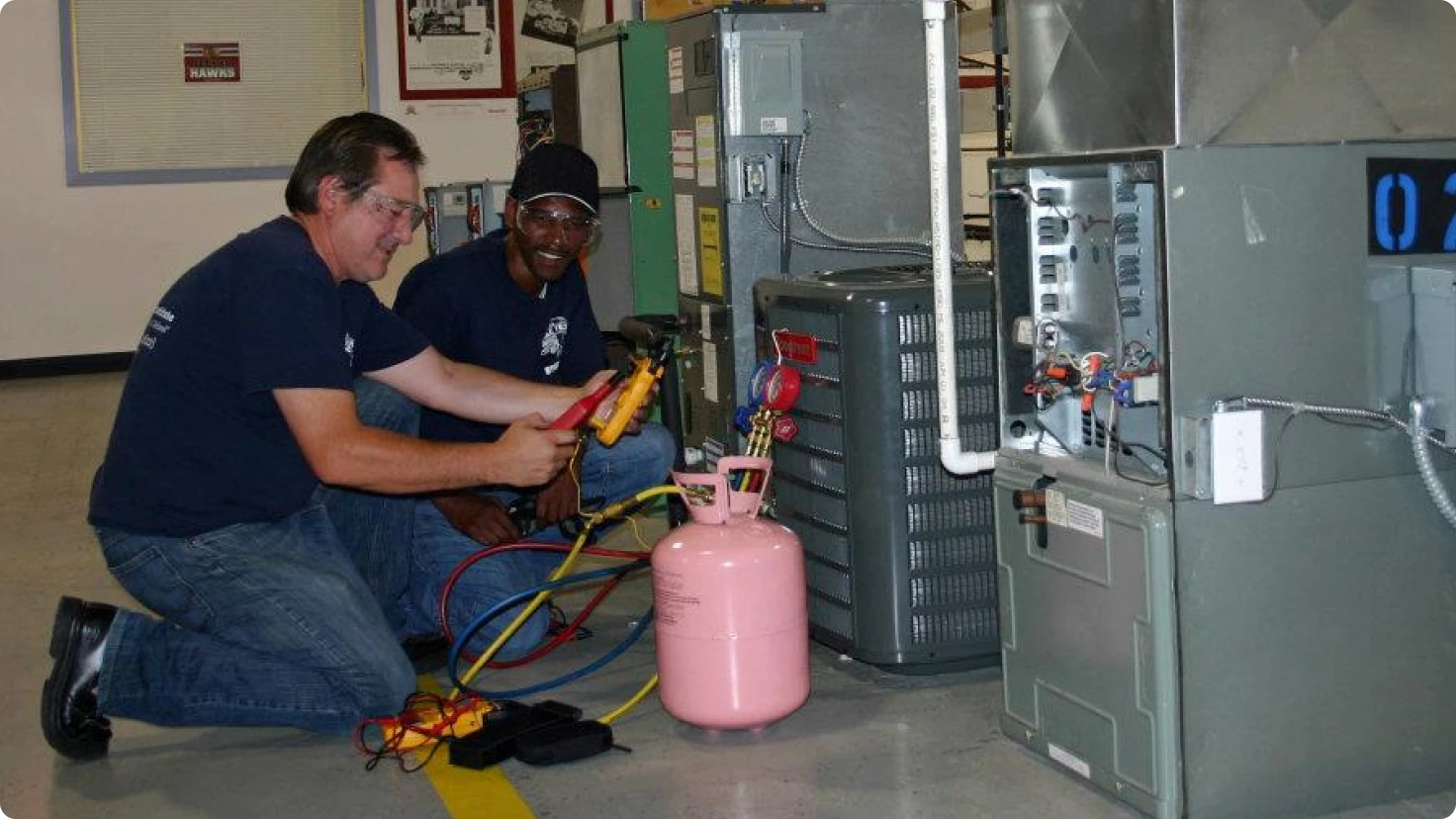
Students Of Hvac Technical Institute In Chicago
HVAC schools and training programs in Illinois
Here are some HVAC schools and training programs in Illinois:
- Midwest Technical Institute in Springfield and East Peoria, Ill, US
- Illinois Central College in East Peoria, Ill, US.
- Richland Community College in Decatur, Ill, US.
- Kaskaskia College
- HVAC Technical Institute in Chicago, Ill, US.
- Waubonsee Community College, Ill, US
- College of Lake County, Ill, US.
- Elgin Community College, Ill, US.
- Illinois Central College, Ill, US.
FAQs about HVAC licensing in Illinois
Here are some frequently asked questions about HVAC licensing in Illinois.
What is EPA Section 608 Certification, and why do I need it?
EPA Section 608 Certification is a crucial credential required for HVAC professionals who work with refrigerants. It is a federal certification issued by the Environmental Protection Agency (EPA) to ensure that individuals who handle refrigerants are knowledgeable about the safe and environmentally responsible management of these substances. Refrigerants are chemicals commonly used in air conditioning, refrigeration, and heat pump systems.
This certification is divided into four types, each related to the type of HVACR system and refrigerants they involve:
- Type I Certification: For technicians working with small appliances containing five pounds or less of refrigerant.
- Type II Certification: For technicians working with high-pressure systems, including residential and commercial air conditioning systems.
- Type III Certification: For technicians servicing or repairing low-pressure systems, like chillers or industrial process refrigeration systems.
- Universal Certification: Covers all three types and is recommended for technicians working with a wide range of HVACR systems and refrigerants.
Having the EPA Section 608 Certification not only ensures compliance with federal regulations but also showcases your competence in handling refrigerants safely and responsibly.
Why you need EPA Section 608 Certification
- Legal Requirement: The Clean Air Act of 1990 mandated the EPA to establish regulations for the handling of refrigerants. To comply with these regulations, anyone who works with refrigerants must hold EPA Section 608 Certification. This includes HVAC technicians, contractors, and even equipment owners who service their own systems.
- Environmental Protection: Refrigerants can contribute to ozone depletion and climate change if released into the atmosphere. EPA Section 608 Certification ensures that HVAC professionals are trained to prevent refrigerant leaks, recover and recycle refrigerants properly, and handle refrigerants safely to minimize their impact on the environment.
- Safety: Refrigerants can pose health risks if mishandled. Certification training covers safe handling procedures, including preventing exposure to refrigerants and understanding the potential hazards associated with them. This knowledge safeguards both HVAC technicians and the general public.
Can I work without an HVAC license in Illinois?
No, in Illinois, it is illegal to practice HVAC work without the appropriate license. The state requires HVAC professionals to be licensed to ensure that individuals conducting HVAC installations, repairs, and maintenance have the necessary qualifications.
Working without a license not only puts you at risk of legal consequences but also jeopardizes the safety and satisfaction of clients. Obtaining a license not only fulfills legal obligations but also demonstrates your commitment to professionalism, safety, and quality workmanship.
